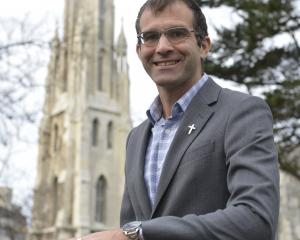
Sooner or later, I would like to suggest, everyone prays. Whether it is to Jesus, another deity, or the universe, prayer is shall we say, a "natural" response to our reality.
Life is unpredictable; sometimes it is overwhelming in desperate situations and sometimes it is beautiful and rewarding.
In your current experiences, prayer need not be the stranger we might imagine.
Simply put, there are times and seasons in our lives where the next logical step is to pray.
"I don’t know if you’re up there ...", "if anyone is listening ...", "Oh God!" or to those familiar, "Our Father ... " are the beginnings of a dialogue with the divine.
Often behind these prayers is a desire for restoration or hope, which is perhaps the most powerful of human motivators.
As a Christian pastor, one of the invitations I extend to people and encourage them to grow, is discovering hope through the practice of prayer. Talking to God. Genuine heartfelt words are the key, it doesn’t need to be fancy. These are the beginnings of faith. Learning to grow in conversations with God may begin with "My Father ... " and end with a simple "OK, thank you". As you grow in confidence, you will find yourself moving through awkward uncertainty to a rewarding, hope-filled practice as you navigate through the ups and downs of life. 1 John 5:14 says "And this is the confidence that we have toward him, that if we ask anything according to his will he hears us."
I appreciate that some may think prayer is a deception — "Talking to someone in the sky, imagining that God hears and answers".
Yet for thousands of years, across all cultures, human beings have practised prayer, meditation, or some form of communion with the supernatural to their benefit. Recent scientific studies have observed that people with a practised faith have a full seven years longer life expectancy than people with no faith at all. These kinds of significant trends are important, as we can sometimes lose an objective sense of the impact of prayer and spirituality, which may be affected by an individual’s compelling narratives on certain unanswered prayers.
While science is still trying to discover meaningful ways to evaluate the impact of prayer, you will find that history is full of faithful Christians whose prayers have resulted in amazing experiences of the divine here in our natural world.
Today is no different. In the 19 years that I have been interacting with people in this space, we have seen many prayers answered, including for healing. Prayer isn’t always about a "yes" answer, though. Sometimes people journey for a while in the uncertainty of divine silence, others may get a "no" which they ultimately end up appreciating. Sometimes the "no" is painful, and sitting with people in the middle of their loss and tears I have been amazed to hear them pray.
A recent prayer meeting at Asbury University, Kentucky US, began with a regular chapel service on February 8 that became a 360-hour non-stop prayer meeting (15 days in total).
Within Christian communities, news of this stirring desire to pray drew thousands of people from across the country and the world to participate. This has now spilled over into multiple colleges and campuses, among students and adults alike. As the stories of answered prayer start to be reported, you may be inspired.
In times such as we have recently faced with floods and a cyclone in the North Island, or the drought in the South Island, there are a lot of different ways we can respond. Similarly with the devastating earthquake in Turkey and Syria. Have you considered praying? In the face of such unchecked devastation, our first prayer might be "well God, why didn’t you stop this?"
That reaction is a common human one, springing from an appeal to an imagined perfect world, the one which we hope for.
Don’t stop there. We need a bigger hope when we observe the reality of life — we live in a volatile world, accentuated by human intervention.
These horrific events have brought us together in empathy and compassion for those who have lost much ... or everything.
We are already responding in practical ways to bring restoration, and many amazing people have given their time, strength and money to help people rebuild their lives.
For all of us, there’s an invitation to respond in prayer, for people to hope and to heal.
Most people don’t pray for a stranger with the same fervency they would for a loved one, but there’s an opportunity for us to engage with compassion as we see our fellow Kiwis rebuild their lives.
As we do, its likely that we will discover God has already been moving in individual situations against the backdrop of devastating reality; saving, providing, comforting and empowering, as well as working to bring hope to people that have lost everything else.
We might want to start on our own, or we might want to explore prayer with other people of faith in community.
So I encourage you to ask at your local church about prayer, or search for prayer events happening in the city.
■Gabriel Chan is a senior leader at Elim Church, Dunedin.












